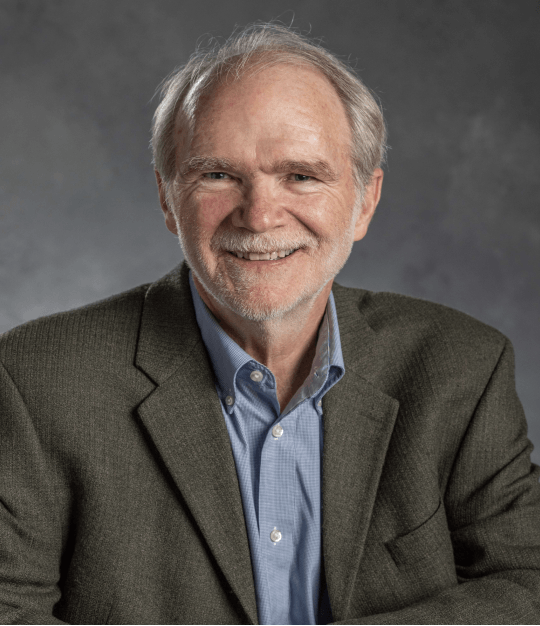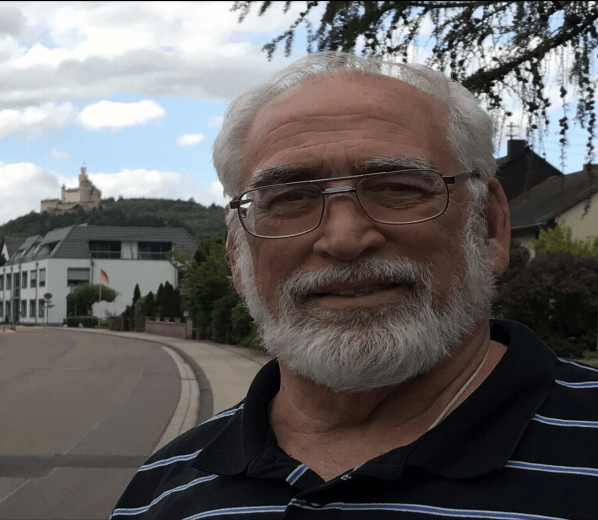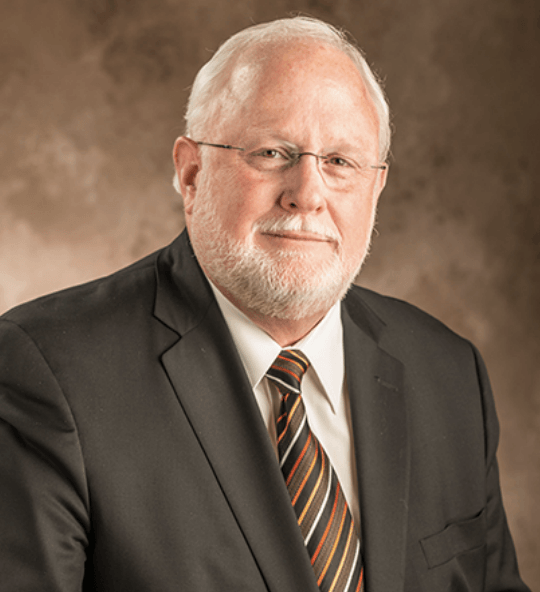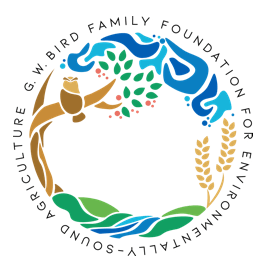Hero Awards
2023 HERO AWARDS
Hero Awards Presented November 16, 2023
Mark Otto,
Owner, Chief Consultant and
Research Advisor Agri-Business Consultants
Mark Otto is a true pioneer in the domains of IPM (Integrated Pest Management) consulting, pest scouting methodology and soil nutrient management monitoring. He has consulted in these areas for a major portion of the Michigan potato acreage and trained numerous pest scouts. A significant number of these individuals have gone on to have their own consulting responsibilities or become part of the overall agricultural business community. If you have every worked in the field with Mark, you know that he is an extremely hard worker and pays great attention to details. Prior to forming Agri-Business Consultants Inc in 1983, he was in the Peace Corp and served as the MSU IPM Vegetable Crop Coordinator. In addition to applied consulting, Mark has served as a potato research advisor at both the state and national levels. He has maintained his international interests as an agricultural consultant for Winrock in both Africa and Central Asia. Mark has always had environmentally-sound agriculture as one of his key objectives.
Joe Scrimger,
Owner and Chief Consultant-Educator Bio-Systems
As owner, operator and principal consultant of Bio-Systems, Joe Scrimger’s farm background had a major impact on his career in environmentally-sound agriculture. Joe grew up on a small dairy farm in Lapeer county and attended Western Michigan University majoring in engineering. Until recently, he managed 120 acres of agronomic crops certified organically by OCIA, in addition to his activities as owner, operator and chief consultant of Bio-Systems (https://www.facebook.com/joe.scrimger/). Through his role in Bio- Systems, Joe facilitated major positive environmental and productivity impacts on a significant number of farms throughout diverse areas of Michigan an Ontario. These include small farms, large farms, agronomic farms, fruit orchards, vineyards, agronomic crop farms, animal agriculture farms and organic agriculture enterprises. He also works closely with the Amish community. Bio-Systems provided soil testing, biological technology and marketing services. More recently Bio-Systems II has evolved in a way to allow Joe to spend family time with his grandchildren. Joe’s 40+ years of work though Bio-Systems has involved one on one in- person on-farm dialogue and demonstration initiatives, and numerous multi person / multiple instructor educational events. In addition to applied agriculture, Bio-Systems has focused on promotion of access of local food to consumers, food quality, human nutrition the importance of viable communities and reminding institutions about their overall responsibilities in regards to the environment. In addition to this Environmentally-Sound Agriculture Hero award, Joe has been recipient of Young Farmer, Public Service and Life Time Achievement awards.
Michigan Potato Industry Commission
In 2011, the Michigan potato industry identified soil heath as a key topic for research. With support from the Michigan Potato Industry Commiission (MPIC) and participation of six Michigan potato farms, the research project detailed soil health improvements between 2012 and 2022 at 68 sites in 17 commercial potato fields in Mecosta and Montcalm counties. Specific criteria for the fields included each farm’s top potato-yielding field, a field with a history of scab, and a field with severe potato early-die disease issues. Between the 2012 initial samples and the 2022 retesting, growers focused on four key areas: increased use of cover crops and compost, reduced chemical inputs, and reduced tillage. Using the Cornell University Soil Health Laboratory’s twelve soil health indicators, it was determined 100% of the 68 sites showed increased available water capacity, soil organic matter, and active carbon. In addition, 94% of the fields had a reduction in root-lesion nematodes. This documentation of soil health improvement is not only of value to the long-term success of environmentally-sound agriculture but is important to farmers as they develop their sustainability plans for crop marketing purposes.
In addition to soil health leadership on a national and global basis, the environmentally-sound agriculture activities of MPIC include extensive policy and educational initiatives related to freshwater security. These include develop of Irrigation Best Management Practices through on- farm demonstrations, including evaluating and retrofitting the existing irrigation systems, measuring the improved water and energy use efficiency, and estimating the potential reduction of greenhouse gas emission and cost savings. Potatoes are the number one non-grain food crop on a global basis. Through their concern for soil health and freshwater security, MPIC has demonstrate outstanding leadership in environmentally-sound agriculture related to this important crop.
AgroLead
Under the leadership of CEO Gulnaz Kaseeva
Kyrgyzstan is small mountainous nation in Central Asia with a population of about 6.7 million. Bishkek is its capital city. The Kyrgyz Republic has a rich history of both animal and crop agriculture. Forty-four percent of the land used for pasture and seven percent for crops. The majority of the farms are small and most produce potatoes. In Kyrgyzstan the potato is known as the second bread. Much of Kyrgyz agriculture had to be reinvented after Soviet times. Under the excellent leadership of Gulnaz Kaseeva, AgroLead is a group of agricultural companies (http://agrolead.org). These include Public Association (PA), AgroLead Plus and Fair Match. PA AgroLead is an agricultural consulting and capacity building organization involved in training marketing and information services related to environmentally-sound agriculture. AgroLead Plus is a community service cooperative that brings farmers together for production and supply services. Fair Match is a network that involves building global value chains. E-trade, an E-library, Agri-news and market prices are some of Agro-Lead’s specific activities available to farmers. In summary, AgroLead activities include training, consulting, demonstrating technologies, making high quality seed available, cooperative marketing services, and building global value chains designed to foster environmentally-sound agriculture. AgroLead’s focal point is the Kyrgyz farmer. Kyrgyzstan is also known as the “land of the hats”.
Brad Morgan
Morgan Composting Inc.
By 1996, Brad and his father Dale realized that their 200 dairy cow herd created a manure problem, so they sold the cows and started a compost company, Morgan Composting Inc. Today, the company has multiple locations, employs more than forty individuals, and provides compost for more than 250,000 acres of farmland. Because of the unique issues related compost production and use, Brad has always been a strong promoter of environmentally-sound agriculture. Morgan Composing Inc. is not just a producer of compost. it is highly engaged in both research and education. The research is done by both Morgan employees and in cooperation with Michigan farmers and research institutions. Shortly after the company was formed, Brad began to sponsor well-attended annual education programs at the company headquarters in Sears, Michigan. In addition to being a highly skilled businessman, Brad’s talents include marketing of numerous types of DairyDoo compost for agricultural, garden, landscape, and homeowner purposes. Morgan Composting Inc. products are on display at numerous local and national retail stores. The products are well-advertised in most of the agricultural trade journals. Brad is always trying to improve his products to make sure that they enhance and are environmentally- sound in whatever ecosystem they are used in.
Bardenhagen Farms
Jim and Jill
Jim and Jill are outstanding examples of Michigan farmers with a true environmentally-sound conscience. As sixth generation operators of Bardenhagen Farms, they grow apples, apricots, nectarines, table grapes, peaches and plums (https://bardenhagenfarms.com). What a great diversity of tree fruit and vine crops! In addition to their farm stand that is open from July through December, their produce are available through local grocery stores, farm markets, distibiutors, brokers, the local food cooperative, local schools, via online ordering and a CSA (Consumer Supported Agriculture) organization. More than 150 yeas ago Bardenhagen Farms was a Homestead Farm producing milk, grain, corn, hay and potatoes. Over time it evolved to focusing on potatoes, strawberries, cauliflower and both sweet and tart cherries, before its current focus on tree and vine fruit. of the physical disturbance of soil in potato production and use of chemical insecticides, fungicides and soil fumigatns in tree fruit production, Jim became was interested in soil health and environmentally-sound agricultural practices in general. The Bardenhagen farm focuses on fresh, tasty and high quality fruit produced in an environmentally-sound manner.
Almar Organic Orchards and Farm Store
Jim and Karen Koan
Apple production has been a Koan family business since the 1800s. As young adults, both Jim and Karen had teaching careers. In 1978, Jim returned to the farm. Because of his environmentally-sound agriculture interests, it was decided to convert a portion of the farm to a certified organic orchard. After learning how to raise organic apples, the entire 150 acres of orchards were transitioned to certified organic. Today, Almar Orchard and Cidery, with its 150 acres of fruit, is one of the largest certified organic orchards in the eastern part of the U.S. (https://www.almar-orchards.com/history/). The farm was a true pioneer in learning how to use animals for control of apple pests. Jim and Karen, however, never lost their teaching gene. The farm serves a place-based education class room for children and adults of all ages and backgrounds. In addition, Jim has given invited presentations at numerous agricultural educational events. Jim and Karen are also highly skilled at marketing. The farm store is unique and open year-round. A significant portion of the customers travel long distances to shop at the store because of the USDA organic label and maybe even the donuts. Value added products are a key part of the enterprise. J. K. Scrumpys certified organic hard cider is well known and marketed nationally. More recently, energy drinks have been added to the list of the farm’s products. There is a rumor, however, that the Koans may not have air conditioning in their home, but the farm’s raindeer have an air conditioned barn.
2022 HERO AWARD
Proudly presented to Stuart Gage
Stuart is the recipient of the Hero Award that was presented on Thursday, October 27, 2022.
Stuart Gage
Dr. Stuart Gage was an innovative and pioneering scientist. At his core, he was a broad naturalist who was intrigued by all interacting components of agricultural, natural and human living environment systems. In the early stages of Stuart’s career in entomology, he implemented a successful biological control system for cereal leaf beetle and worked on innovative management systems for several pests. Stuart developed remarkable skills in ecological modeling. He applied them to his research, including studying the annual introduction of pests over long distances on weather fronts. As a highly proficient modeler, Stuart developed a renown spatial ecology laboratory at MSU. His foresight in establishing a long-term insect monitoring program as part of the Kellogg Biological Station, Long-term Ecological Research project fostered the discovery of decades-long changes in populations of lady bird beetles and other important predators of pests in agricultural landscapes. This led to his work in soundscape ecology where he made recordings from around the world for measuring the diversity and health of the environment. As a profound entomologist and ecologist, Stuart had the ability to interact with a broad array of scientists and students. He was an amazing visionary, with a powerful skill set in biology and electronic technology. Stuart’s contributions to environmentally-sound agriculture have had very significant and ever-expanding positive impacts on overall quality of life.
2022 Hero Award Ceremony
- Recap Video -

Phillip Robertson
Dr Gage was a scientific pioneer in insect ecology: first in the development of Integrated Pest Management as a crop management strategy to reduce the burden of agricultural insecticides in the environment, second in the use of GIS to track long-term trends in insect abundance, and finally in acoustic ecology. His early work with others on cereal leaf beetle helped to develop the field of biological pest control using, in this case, beneficial parasitoids that since the 1970s have kept this important pest of wheat under control in Michigan and the Midwest. Likewise, his foresight in establishing a long-term insect monitoring program as part of the KBS Long-term Ecological Research project has allowed the discovery of decades-long changes in populations of lady bird beetles, among other important predators of pests in agricultural landscapes. This data stream, still active today, has documented declines in native beetle species as exotics have arrived, and as well the influence of different habitats on species persistence and long-term population cycles. And his later interest in acoustic ecology helped to stimulate interest in a novel topic that has now matured into its own subfield in ecology. For his groundbreaking work in these and other areas Stuart Gage is eminently qualified to receive this award.

Mark Scriber
Stuart Gage was well-known in insect population biology and integrated pest management well before I met him as the incoming Chairperson of the Entomology Department at MSU in 1986. We instantly started a collaborative project at KBS in Agroecology under the NSF-funded Long Term Ecological Research initiatives. Stuart and I soon recruited a superstar in Environmentally- sound Agriculture named Karim Maredia to join us in the LTER project at the Kellogg Biological Station. Karim significantly increased the international respect for leadership in this field, with help from Stuart in following years. I was amazed by the ability of Stuart to envision the future of pest management via spatial analyses of insect populations as exemplified by the rapid implementation of state- wide gypsy moth monitoring and management based on a network of pheromone trapping. To my knowledge, this system was the first example of how we could actually, and quite accurately, predict where gypsy moth outbreaks would occur in the next year and the future. Stuart and I also published a book chapter using spatial analyses of host plant distributions and hybrid zone dynamics of my Papilio research, predicting where gene flow could occur with increased degree-day accumulations in the future with climate change. Stuart also initiated a multistate research initiative using spatial and temporal analysis of corn pollination phenology across North America with the increased concern for genetically engineered toxins in corn (to manage corn borers) regarding the negative non- target impacts monarch butterflies in their annual migrations. He later wrote a book on aero-biology and was almost lured away for an Endowed Chair at Ohio State University. Always 2-3 standard deviations ahead of his colleagues internationally, Stuart became fascinated by environmental sounds and basically created a completely new field of study which has been growing rapidly around the world. Stuart continued to provide scientific leadership in this field sound-ecology well past his official retirement from MSU. While Stuart's creative and insightful abilities to provide leadership in environmentally-sound agroecology were well ahead of his colleagues, there have been enough "early adopters" to initiate and implement several of his visions for the benefit of millions. He was also able to portray how climate-warming could alter the biology of pest species and their interactions with changing plant phenologies. We now realize how this climate warming not only affects agricultural pest and cropping management, but also how the increased population movements latitudinally bring new concerns about human disease vectoring by insects! An amazing visionary, with a powerful skill set in computers as well as biology, Stuart was unique and inspirational in many ways. I feel honored to have known him as a friend and colleague."

Fred Poston
Dr. Stuart Gage was an innovative and pioneering scientist. At his core, he was a broad naturalist who was intrigued by all interacting components of agricultural, natural and human living environment systems. In the early stages of Stuart’s career in entomology, he implemented a successful biological control system for cereal leaf beetle and went on to work on innovative management systems for several pests. Stuart developed remarkable skills in ecological modeling. He applied them to his research, including studying the annual introduction of pests over long distances on weather fronts. As a highly proficient modeler, Stuart developed a renown spatial ecology laboratory at MSU. His foresight in establishing a long-term insect monitoring program as part of the Kellogg Biological Station, Long-term Ecological Research project fostered the discovery of decades-long changes in populations of lady bird beetles and other important predators of pests in agricultural landscapes. This led to his work in soundscape ecology where he made recordings from around the world for measuring the diversity and health of the environment. As a profound entomologist and ecologist, Stuart had the ability to interact with a broad array of scientists and students. He was an amazing visionary, with a powerful skill set in biology and electronic technology. Stuart’s contributions to environmentally-sound agriculture have had very significant and ever-expanding positive impacts on overall quality of life.
Foundation History
Professor Bird’s colleagues, students and family organized the Foundation in 2022, in honor of his research, teaching contributions to the domains of Integrated Pest Management (IPM), Sustainable Agriculture and Sustainable-Equitable Development. These transdisciplinary contributions were made possible because of Professor Bird’s training in nematology, plant pathology, entomology, and horticulture.
JOIN OUR NEWSLETTER
We will get back to you as soon as possible
Please try again later
